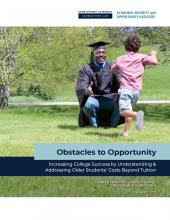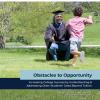0
Publication
Community:
Aug 26, 2021
The National CLAS Standards are intended to advance health equity, improve quality, and help eliminate health care disparities by establishing a blueprint for health and health care organizations
Authored by: Think Cultural Health, an initiative of the Office of Minority Health, U.S. Department of Health & Human Services.
Topics: Communications, Health, Immigrants
 Shared by Camille Anoll-Hunter
Shared by Camille Anoll-Hunter
Camille Anoll-Hunter posted a
on Aug 26, 2021
Think Cultural Health, an initiative of the Office of Minority Health, U.S. Department of Health & Human Services.
The National CLAS Standards are intended to advance health equity, improve quality, and help eliminate health care disparities by establishing a blueprint for health and health care organizations
0
Publication
Community:
Jan 14, 2021
A Playbook for Local Health Department Strategies in the United States
Authored by: The National Community-Based Workforce Alliance
Topics: COVID-19, Health
 Shared by Camille Anoll-Hunter
Shared by Camille Anoll-Hunter
Camille Anoll-Hunter posted a
on Aug 26, 2021
The National Community-Based Workforce Alliance
A Playbook for Local Health Department Strategies in the United States
0
News Article
Community:
Jan 6, 2020
Scope of Practice article on the American Medical Association's website
Authored by: Tanya Albert Henry, American Medical Association
Topics: Cost effectiveness, Health
 Shared by Camille Anoll-Hunter
Shared by Camille Anoll-Hunter
Camille Anoll-Hunter posted a
on Aug 26, 2021
Tanya Albert Henry, American Medical Association
Scope of Practice article on the American Medical Association's website
0
Webinar
Community:
Aug 24, 2021
Community Health Workers (CHWs) are taking a larger role in patient-centered care and community health. Yet, questions remain around the scope of their work, licensure requirements, and available funding sources to build a capable workforce. In this webinar, we will clarify their work and explore their role in advancing equity. We will hear from Ashley Rodriguez, chair of the American Public Health Association’s Community Health Worker Section. Rodriguez is leading national efforts to promote CHWs’ work and support their professional development. Jenna Grant, a resource development manager with the Tulsa Health Department, will share examples of CHW equity-building work in Oklahoma, including the recent CHW-led movement to gain certification for a sustainable workforce. This webinar will be especially helpful for those seeking strategies to strengthen CHWs’ capacity to build equity in communities.
Authored by: County Health Rankings & Roadmaps
Topics: Health, Preventative care
 Shared by Camille Anoll-Hunter
Shared by Camille Anoll-Hunter
Camille Anoll-Hunter posted a
on Aug 26, 2021
County Health Rankings & Roadmaps
Community Health Workers (CHWs) are taking a larger role in patient-centered care and community health. Yet, questions remain around the scope of their work, licensure requirements, and available funding sources to build a capable workforce.
0
Podcast
Community:
Aug 19, 2021
The social determinants of health are interactive and multi-faceted, but often the experts who address them are siloed—as are their data. How do we share the data that can tell us the full story about the people who rely on—and receive—support? Chris Tappan and Lori Hunter discuss data systems, collaboration between agencies, and the vital importance of equitable services in this latest episode of The Intersect.
Authored by: Abt Associates
Topics: Data sharing, Health
 Shared by Jordan Jackson
Shared by Jordan Jackson
Jordan Jackson posted a
on Aug 19, 2021
The social determinants of health are interactive and multi-faceted, but often the experts who address them are siloed—as are their data. How do we share the data that can tell us the full story about the people who rely on—and receive—support?
0
Report
Community:
Aug 18, 2021
The just-released America After 3PM special report, “STEM Learning in Afterschool on the Rise, But Barriers and Inequities Exist,” finds that afterschool programs are offering more STEM learning opportunities, but inequities exist and too many young people are missing out.
Authored by: America After 3PM
Topics: Education, Youth
 Shared by Jordan Jackson
Shared by Jordan Jackson
Jordan Jackson posted a
on Aug 19, 2021
The just-released America After 3PM special report, “STEM Learning in Afterschool on the Rise, But Barriers and Inequities Exist,” finds that afterschool programs are offering more STEM learning opportunities, but inequities exist and too many young people are missing out.
0
Interactive
Community:
Aug 3, 2021
Use this toolkit to assist in pursuing partnerships with school districts to provide afterschool and summer programs to support student recovery. Districts must spend a minimum of 20% of their funds on learning loss, which explicitly calls out summer and afterschool programs as an allowable use.
Authored by: Afterschool Alliance
Topics: Education, Funding, Out-of-school time
 Shared by Kirsten Greenwell
Shared by Kirsten Greenwell
Kirsten Greenwell posted a
on Aug 3, 2021
Use this toolkit to assist in pursuing partnerships with school districts to provide afterschool and summer programs to support student recovery.
0
Communications
Community:
Jul 30, 2021
A new D.C. Federal Nutrition Programs Toolkit is designed to help community-based organizations, social service and healthcare providers, District agencies, and community members connect low-income households with federal nutrition programs. Beverley Wheeler, director of D.C. Hunger Solutions, told The DC Line, “with this toolkit, our community leaders can play a key role in ensuring children, young adults, adults, and older adults can connect with the right providers to help gain access to the nutrition they need for their health and well-being.”
Authored by: D.C. Hunger Solutions
Topics: East Coast, Food insecurity
 Shared by Kirsten Greenwell
Shared by Kirsten Greenwell
Kirsten Greenwell posted a
on Jul 30, 2021
A new D.C. Federal Nutrition Programs Toolkit is designed to help community-based organizations, social service and healthcare providers, District agencies, and community members connect low-income households with federal nutrition programs. Beverley Wheeler, director of D.C.
0
Webinar
Community:
Jul 30, 2021
This webinar encouraged HUD staff and stakeholders to learn how public health data sharing agreements can better inform on-the-ground vaccine efforts.
Authored by: HUD Exchange
Topics: COVID-19, Data sharing, Health
 Shared by Kirsten Greenwell
Shared by Kirsten Greenwell
Kirsten Greenwell posted a
on Jul 30, 2021
This webinar encouraged HUD staff and stakeholders to learn how public health data sharing agreements can better inform on-the-ground vaccine efforts.
0
Policy Brief
Community:
Jun 30, 2021
Every child in an early childhood setting should have a teacher with specialized education to promote that child’s cognitive, social, emotional, and physical development and who prepares them for success in school and in life. The National Research Council’s report from a panel of experts, Transforming the Workforce for Children Birth Through Age 8: A Unifying Foundation, lays out several recommendations for programs serving children from birth through age 8, notably that teachers "should have at a minimum a bachelor’s degree and specialization in the knowledge and competencies needed to serve as a care and education professional.
Authored by: Child Care Services Association & T.E.A.C.H.
Topics: Early childhood, Education, Post-secondary
 Shared by Kirsten Greenwell
Shared by Kirsten Greenwell
Kirsten Greenwell posted a
on Jun 30, 2021
Child Care Services Association & T.E.A.C.H.
Every child in an early childhood setting should have a teacher with specialized education to promote that child’s cognitive, social, emotional, and physical development and who prepares them for success in school and in life.
0
Podcast
Community:
Jun 16, 2021
The social determinants of health are interactive and multi-faceted, but often the experts who address them are siloed—as are their data. How do we share the data that can tell us the full story about the people who rely on—and receive—support? Chris Tappan and Lori Hunter discuss data systems, collaboration between agencies, and the vital importance of equitable services in this latest episode of The Intersect.
Authored by: Eric Tischler, Chris Tappan, and Lori Hunter with ABT Associates
Topics: Child welfare, COVID-19, Data sharing, Health
 Shared by Camille Anoll-Hunter
Shared by Camille Anoll-Hunter
Camille Anoll-Hunter posted a
on Jun 25, 2021
Eric Tischler, Chris Tappan, and Lori Hunter with ABT Associates
The social determinants of health are interactive and multi-faceted, but often the experts who address them are siloed—as are their data. How do we share the data that can tell us the full story about the people who rely on—and receive—support?
0
Publication
Community:
Jun 17, 2021
Authored by: U.S. Department of Housing and Urban Development Choice Neighborhoods
Topics: Attendance, COVID-19, Early childhood, Education, Family engagement, Housing, Low-income, Out-of-school time, Youth
 Shared by Kirsten Greenwell
Shared by Kirsten Greenwell
Kirsten Greenwell posted a
on Jun 17, 2021
U.S. Department of Housing and Urban Development Choice Neighborhoods
0
Report
Community:
May 6, 2021
As evidence grows that housing mobility programs can vastly improve residents’ life trajectories, today the Robert Wood Johnson Foundation, Institute for Health and Social Policy based at Johns Hopkins Bloomberg School of Public Health, and a network of experts released a report to help inform and guide supplementary research on the new Housing Choice Voucher (HCV) Mobility Demonstration Program from the U.S. Department of Housing and Urban Development (HUD).
Including input from leaders in the housing, health, education, and economic development fields, the Report of the Housing Mobility Research Road Map Project provides research considerations for the HCV Mobility Demonstration Program, which will begin funding nine public housing agencies in Spring 2021 to provide housing vouchers and mobility services to help families move to lower-poverty neighborhoods.
Housing mobility programs have the potential to disrupt historic patterns of segregation and increase families’ economic mobility. As these programs are implemented, there will be opportunities for research to inform a broad range of public policies including health, education, and housing policy.
Authored by: Oktawia Wójcik for ROBERT WOOD JOHNSON FOUNDATION & Craig Pollack for JOHNS HOPKINS UNIVERSITY
Topics: Advocacy, Housing, Legislation & Policy, Mobility, Racial inequalities
 Shared by Housing Is
Shared by Housing Is
Housing Is posted a
on May 25, 2021
Oktawia Wójcik for ROBERT WOOD JOHNSON FOUNDATION & Craig Pollack for JOHNS HOPKINS UNIVERSITY
As evidence grows that housing mobility programs can vastly improve residents’ life trajectories, today the Robert Wood Johnson Foundation, Institute for Health and Social Policy based at Johns Hopkins Bloomberg School of Public Health, and a network of experts released a report to help inform and g
0
Policy Brief
Community:
May 5, 2021
In March 2020, the COVID-19 pandemic forced many public housing authorities (PHAs) to quickly adjust their operational procedures to protect their staff while providing emergency assistance to residents. Many PHAs had to close their offices and convert to remote operations almost overnight, while staff focused on supporting their tenants by delivering them food, doing wellness checks for vulnerable residents, and ensuring they had access to and in some cases providing the technology needed for children to attend school remotely and isolated residents to remain connected to friends, family, and service providers. Moreover, as the economic crisis caused by the pandemic worsened, PHAs were under pressure to rapidly adjust rents for tenants who had lost income and process housing choice voucher (HCV) applications so people could use their vouchers to find housing. This brief provides insights into how public housing authorities used additional flexibilities that became available through a series of HUD-issued regulatory and statutory waivers, and makes the case for the potential benefits for added flexibilities for the HCV and public housing programs going forward.
Authored by: Monique King-Viehl, Elizabeth Champion, & Susan J. Popkin for URBAN INSTITUTE
Topics: Advocacy, COVID-19, Data sharing, Health, Housing, Safety, Supportive housing
 Shared by Housing Is
Shared by Housing Is
Housing Is posted a
on May 25, 2021
Monique King-Viehl, Elizabeth Champion, & Susan J. Popkin for URBAN INSTITUTE
In March 2020, the COVID-19 pandemic forced many public housing authorities (PHAs) to quickly adjust their operational procedures to protect their staff while providing emergency assistance to residents.
0
Report
Community:
May 13, 2021
Tim Higashi and Stuart M. Butler look at several examples of innovative ways in which communities responded to COVID-19 by using a variety of special techniques to “braid and blend” funds from different programs and sources to address pressing health, education and other service need. They argue that such special flexible budgeting techniques should not end with the pandemic, but should become an integral feature of budget procedures to enable communities to reach social goals
Authored by: Stuart M. Butler and Timothy Higashi for THE BROOKINGS INSTITUTION
Topics: Advocacy, Community development, COVID-19, Data sharing, Funding, Legislation & Policy
 Shared by Housing Is
Shared by Housing Is
Housing Is posted a
on May 25, 2021
Stuart M. Butler and Timothy Higashi for THE BROOKINGS INSTITUTION
Tim Higashi and Stuart M. Butler look at several examples of innovative ways in which communities responded to COVID-19 by using a variety of special techniques to “braid and blend” funds from different programs and sources to address pressing health, education and other service need.
0
Video
Community:
May 20, 2021
Based off of data that Ohio has high rates of infant mortality, housing authorities there are working to address this concern, which disproportionately affects people of color. Under different initiatives, the Akron and Columbus Metropolitan Housing Authorities collaborate with cross-sector partners like mayor’s offices and public health officials to improve outcomes. Panelists will describe their efforts, tactics to reach at-risk families, and ways to fund the work.
Authored by: CLPHA
Topics: Advocacy, Child welfare, Community development, Health, Healthy homes, Legislation & Policy, Pre-natal, Racial inequalities
 Shared by Housing Is
Shared by Housing Is
Housing Is posted a
on May 20, 2021
Based off of data that Ohio has high rates of infant mortality, housing authorities there are working to address this concern, which disproportionately affects people of color.
0
Report
Community: Postsecondary
May 20, 2021
Higher education offers millions of people the opportunity to improve their financial well-being. However, higher education is prohibitively expensive and can saddle people with insurmountable debt. Costs beyond tuition—such as housing, food, child care, and transportation—are large, essential components of the cost of attending college for students. In order to better understand how these living costs add up and vary, this report offers estimates of costs beyond tuition for older students between the ages of 25 – 45, who make up roughly one-third of college students and face unique barriers to college access and completion. The report shows that the real cost of college for older students is higher than commonly understood, examines older students’ challenges with financial aid and public benefits programs, and offers policy recommendations to address costs beyond tuition and improve college access and success for older students.
Authored by: Vincent Palacios, Casey Goldvale, Chris Geary & Laura Tatum for GEORGETOWN LAW
Topics: Attendance, Community development, Education, Housing, Post-secondary, Stability, Workforce development
 Shared by Housing Is
Shared by Housing Is
Housing Is posted a
on May 20, 2021
Vincent Palacios, Casey Goldvale, Chris Geary & Laura Tatum for GEORGETOWN LAW
Higher education offers millions of people the opportunity to improve their financial well-being. However, higher education is prohibitively expensive and can saddle people with insurmountable debt.
0
Video
Community:
May 18, 2021
In 2019, CLPHA collaborated with Johns Hopkins University on a member survey to better understand how public housing authorities (PHAs) are serving residents affected by addiction and what policies or resources PHAs continue to need. The intent of CLPHA’s participation in the survey was to identify best practices for most effectively serving residents affected by addiction and inform CLPHA’s advocacy efforts on addiction issues. During this panel, the JHU researchers will review results of the survey and panelists will hear from the PHA perspective about what practices have been most effective and where there is work to be done.
Authored by: CLPHA
Topics: Health, Substance abuse
 Shared by Housing Is
Shared by Housing Is
Housing Is posted a
on May 18, 2021
In 2019, CLPHA collaborated with Johns Hopkins University on a member survey to better understand how public housing authorities (PHAs) are serving residents affected by addiction and what policies or resources PHAs continue to need.
0
Video
Community:
May 18, 2021
The devastating consequences of climate change will continue to impact our everyday lives, testing the resilience of our communities and influencing the processes of how we build housing. PHAs have been on the front-line managing disaster recovery efforts and are well-positioned to be leaders in advancing policies to develop environmentally friendly green infrastructure. This panel will discuss past endeavors to secure safe housing for displaced communities, what steps are required to mitigate future disasters, and how PHAs are designing plans to make greener and more healthier communities.
Authored by: CLPHA
Topics: Community development, Green, Housing
 Shared by Housing Is
Shared by Housing Is
Housing Is posted a
on May 18, 2021
The devastating consequences of climate change will continue to impact our everyday lives, testing the resilience of our communities and influencing the processes of how we build housing.
0
Video
Community:
May 18, 2021
In the past couple of years, people and organizations have been more aware of and interested in discussing racial equity. This session will provide a space to step away from tackling this issue due to social pressures and look at how to think about this work from a systems level and go deeper than just surface efforts. Panelists will discuss how to know when initiatives are actually equitable and how can impact be measured, examining work from a racial equity lens, potential leads to impact, as well as measuring both in the short term as well as long-term.
Authored by: CLPHA
Topics: Community development, Metrics, Racial inequalities
 Shared by Housing Is
Shared by Housing Is
Housing Is posted a
on May 18, 2021
In the past couple of years, people and organizations have been more aware of and interested in discussing racial equity.
0
Video
Community:
May 18, 2021
Over the past several years, CLPHA has worked with its members to disseminate information on the best eviction prevention practices and many public housing authorities (PHAs) have made great progress in developing new strategies to keep families housed. The eventual ending of the CDC eviction moratorium provides an opportunity for PHAs to review their eviction prevention strategies. Panelists will review the latest research on COVID-19 and evictions, protecting voucher holders from eviction, and work that PHAs are doing to evaluate their own eviction practices through a racial equity lens.
Authored by: CLPHA
Topics: Community development, COVID-19, Healthy homes, Homelessness, Housing, Legislation & Policy, Racial inequalities
 Shared by Housing Is
Shared by Housing Is
Housing Is posted a
on May 18, 2021
Over the past several years, CLPHA has worked with its members to disseminate information on the best eviction prevention practices and many public housing authorities (PHAs) have made great progress in developing new strategies to keep families housed.
0
Video
Community:
May 18, 2021
As public housing authorities have worked to keep residents and staff safe from COVID-19, they have turned from focusing on emergency response to longer-term solutions. Sub-grantees from CLPHA’s partnership with the Center for Disaster Philanthropy share how they have been implementing initiatives to counter the digital divide that has only been exacerbated by the pandemic.
Authored by: CLPHA
Topics: Advocacy, Broadband, Community development, Education, Low-income
 Shared by Housing Is
Shared by Housing Is
Housing Is posted a
on May 18, 2021
As public housing authorities have worked to keep residents and staff safe from COVID-19, they have turned from focusing on emergency response to longer-term solutions.













